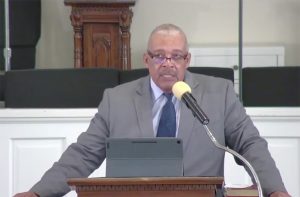Overview of America— Part 2 of 2: The Proper View of Capitalism
This video clip from the documentary video “Overview of America” explains differences between the major economic systems of free market Capitalism, Fascism, Nazism, Socialism, and Communism. It is explained that all types of economic systems include elements of “capital” and “property,” with the differences between the systems being varying combinations of types of ownership and control of those two elements.
Following are key points in the video clip:
[Note: September 17, 2022— Typos in the text of this article have been fixed.]
— Most people are confused about the characteristics of major differing economic systems. During the 20th century, Americans were led to believe that a “great struggle” existed between the Capitalist and Communist worlds, but most people do not know what the defining principals of those systems actually are.
— One of the most basic aspects of any economic system is the concept of “capital,” which means “the means of production.” An example of capital is explained as a spear being made as the result of someone’s time and energy, which can then used to catch fish. Capital can be tools, machinery, and even people.
— By strict definition, every type of economic system is “capitalist,” including Communism. The difference between Communism and the American Capitalist type of system lies in the ownership of the capital. Communist capital is “monopolistic and state controlled,” and American capital is “competitive free enterprise.”
— The term “free market” means a self regulating system where all parties are free to transact with one another. When force, fraud or injury damages one party in such a system, the government’s only role is to punish those who commit the offenses and to vindicate the rights of the other party, which protects the integrity of the free market.
— “Private Property” means private ownership and control of property, which is a key component in the free enterprise system. In order for ownership of private property to be complete, four aspects must be met— the person’s right to title, control, use, and the ability to dispose. In a free market economy these aspects are unrestrained, as long as the person does not infringe upon the rights of others. True ownership of property and freedom go hand in hand.
— Basic differences exist between the two major types of economic systems. In the competitive free enterprise system, capital and property is both owned privately and controlled privately. In a monopolistic system, holding title to capital can be accomplished privately or by the state, however, the capital is always controlled by the state or the elite few who control the state.
— The Communist Manifesto that contains the basic program for all Communist and Socialists explicitly preaches the destruction and abolition of private property. Karl Marx understood the power of controlling capital, as have all Communists who have ever looked to and still look to Marx as their leader. State controlled capitalism (Communism) always results in high prices and low quality, because the lack of competition offers no incentives for improvement.
— On the other hand, hard working competitive free enterprise producers create low prices and high quality. Competition results in excellence, and always has.
— The various economic systems can be plotted along a spectrum representing amounts of government control in the market. The last century has seen four forms of state controlled economies on the far left of the spectrum: Fascism, Nazism, Socialism, and Communism. In each, the government controls the capital, with the difference among these being how much is owned outright by the government. Following are aspects of each:
In a Fascist system, the government does not own businesses on paper, but it does control them. In Mussolini’s Italy, even though he didn’t hold title to businesses, he told the owners what to produce, how much to produce, when to produce, where to buy raw materials, who to hire, who to fire, and what prices to charge. The rest “was up to them.” The fascist system is more efficient than other state controlled systems due to those living under it thinking that they still own their businesses. Such a government controls the owners through an array of taxations and regulations.
Under Nazism, which means “national socialism,” its proponents went one step further and acquired ownership of some corporations such as Volkswagen, however Hitler did not seize ownership of other industrial giants but rather just controlled them in the same way that Mussolini controlled businesses in Italy.
Socialism is where government officials aquire possession of major industries, such as transportation, communications, and utilities, which allows for government to leverage control over the entire economy. Through ownership of these vital segments of the industry and by creating government regulatory agencies, socialists gain control over virtually everything else.
Communism is the “granddaddy of all” in the economic sense. Under this system all of the capital is owned and controlled by the State and there is no pretence of otherwise.
Under Nazism, which means “national socialism,” its proponents went one step further and acquired ownership of some corporations such as Volkswagen, however Hitler did not seize ownership of other industrial giants but rather just controlled them in the same way that Mussolini controlled businesses in Italy.
Socialism is where government officials aquire possession of major industries, such as transportation, communications, and utilities, which allows for government to leverage control over the entire economy. Through ownership of these vital segments of the industry and by creating government regulatory agencies, socialists gain control over virtually everything else.
Communism is the “granddaddy of all” in the economic sense. Under this system all of the capital is owned and controlled by the State and there is no pretence of otherwise.
— Two major types of configurations of goverment and economic types would be an “Oligarchy with a monopolistic, state controlled economy,” and a “Republic with a competitive, free enterprise system economy.” [Also note: The practical application of the government and economy of the United States has been gradually shifting to the left on the spectrum. See the article A Summary of the Booklet “Restoring the Rights of the States and the People”.]
— The Founding Fathers of the U.S. knew that the system of a free market economy in a Republic which they designed would not last without without a certain degree of shared morality in the citizenry. James Madison cautioned, “... limited government alone is inadequate for our nation.” John Adams said, “Our Constitution was made only for a moral and religious people, it is wholly inadequate to the government of any other.” George Washington said, “.. reason and experience both forbid us to expect that national morality can prevail in exclusion of religious principle.” And Benjamin Franklin said, “Only a virtuous people are capable of freedom.. As nations become corrupt and vicious, they have more need of masters.”
— The alternative to Americanism is what has condemned most of humanity to live as slaves throughout the past millennium— where the idea that rights are privileges that are dispensed by an oligarchy, where a nation’s capital and all economic activity are directed from a central power, where morality is inconsequential, and where the need for security is preferred over freedom and opportunity.
— The United States is continuing to be steered off-course through the principals that led to its greatness being cast aside, and what is needed is a sufficient number of Americans to get involved to return the nation to having less government and more personal responsibility of its citizens.
This video is a part of the article: A Summary of the Documentary Video “Overview of America”.





